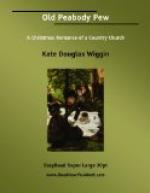Nobody recognized him at the station or noticed him at the tavern, and after his supper he put on his overcoat and started out for a walk, aimlessly hoping that he might meet a friend, or failing that, intending to call on some of his old neighbours, with the view of hearing the village news and securing some information which might help him to decide when he had better lay himself and his misfortunes at Nancy Wentworth’s feet. They were pretty feet! He remembered that fact well enough under the magical influence of familiar sights and sounds and odours. He was restless, miserable, anxious, homesick—not for Detroit, but for some heretofore unimagined good; yet, like Bunyan’s shepherd boy in the Valley of Humiliation, he carried “the herb called Hearts-ease in his bosom,” for he was at last loving consciously.
How white the old church looked, and how green the blinds! It must have been painted very lately: that meant that the parish was fairly prosperous. There were new shutters in the belfry tower, too; he remembered the former open space and the rusty bell, and he liked the change. Did the chimney use to be in that corner? No; but his father had always said it would have drawn better if it had been put there in the beginning. New shingles within a year: that was evident to a practised eye. He wondered if anything had been done to the inside of the building, but he must wait until the morrow to see, for, of course, the doors would be locked. No; the one at the right side was ajar. He opened it softly and stepped into the tiny square entry that he recalled so well—the one through which the Sunday-school children ran out to the steps from their catechism, apparently enjoying the sunshine after a spell of orthodoxy; the little entry where the village girls congregated while waiting for the last bell to ring—they made a soft blur of pink and blue and buff, a little flutter of curls and braids and fans and sunshades, in his mind’s eye, as he closed the outer door behind him and gently opened the inner one. The church was flooded with moonlight and snowlight, and there was one lamp burning at the back of the pulpit; a candle, too, on the pulpit steps. There was the tip-tap-tip of a tack-hammer going on in a distant corner. Was somebody hanging Christmas garlands? The new red carpet attracted his notice, and as he grew accustomed to the dim light, it carried his eye along the aisle he had trod so many years of Sundays, to the old familiar pew. The sound of the hammer ceased and a woman rose from her knees. A stranger was doing for the family honour what he ought himself to have done. The woman turned to shake her skirt, and it was Nancy Wentworth. He might have known it. Women were always faithful; they always remembered old landmarks, old days, old friends, old duties. His father and mother and Esther were all gone; who but dear Nancy would have made the old Peabody pew right and tidy for the Christmas festival? Bless her kind womanly heart!




